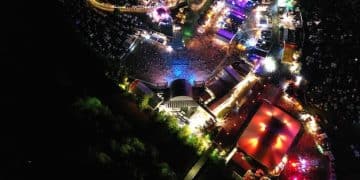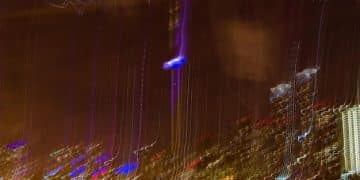Pop Culture’s Impact on Politics: 2025 Analysis
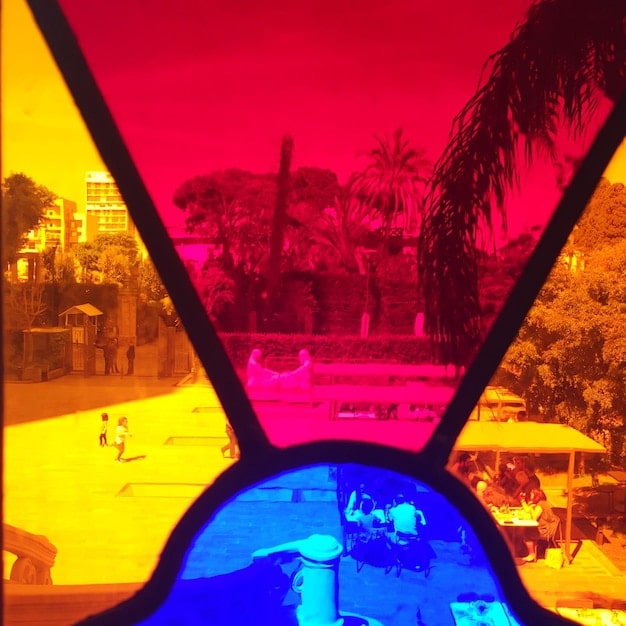
Pop Culture’s Influence on Political Discourse: Analyzing the 2025 Landscape reveals how trends in music, film, and social media increasingly shape political conversations and ideologies among US voters.
The intersection of popular culture and politics has never been more pronounced, especially as we look towards the 2025 landscape. Pop Culture’s Influence on Political Discourse: Analyzing the 2025 Landscape is crucial for understanding how entertainment and social trends are shaping the beliefs and behaviors of US citizens and voters.
The Evolution of Pop Culture and Political Engagement
Pop culture’s engagement with politics has undergone significant changes over the decades. Initially, it was subtle, but it has grown into a powerful force shaping political discourse.
From protest songs in the 1960s to celebrity endorsements in modern elections, the relationship between entertainment and governance has evolved substantially.
Historical Context: Music and Movements
Music has always been a powerful tool for social and political commentary.
- The 1960s saw anthems of peace and change influencing public opinion on the Vietnam War.
- Punk rock in the 1970s challenged political establishments and societal norms.
- Hip-hop in the late 20th century became a voice for marginalized communities, addressing issues like poverty and racial injustice.
Celebrity Activism: A Double-Edged Sword
Celebrities using their platforms to advocate for political causes is increasingly common.
- Endorsements can raise awareness and mobilize voters, but they can also alienate segments of the population.
- Authenticity is key; if celebrity activism appears disingenuous, it can backfire and damage their credibility.
- The impact varies depending on the celebrity’s influence and the political climate.
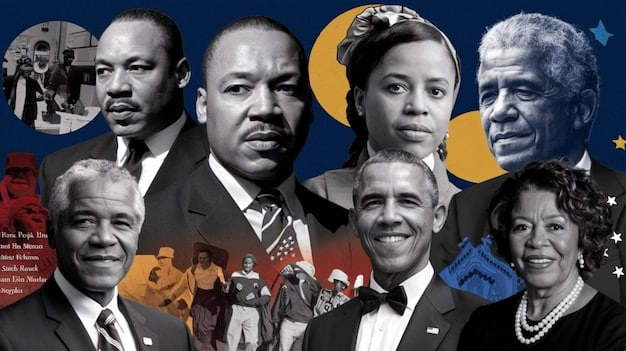
In conclusion, the blending of pop culture and political engagement is a complex phenomenon. Understanding its historical context and potential pitfalls is essential for navigating the landscape.
Social Media as a Political Battleground
Social media has transformed the way political discourse unfolds. It’s a space where trends in pop culture can quickly amplify or distort political messages.
Platforms like Twitter, Facebook, and Instagram have become pivotal tools for political campaigns, advocacy groups, and individual citizens.
Viral Trends and Misinformation
The speed and reach of social media can be both a blessing and a curse.
- Viral trends can quickly bring attention to important issues, but they can also spread misinformation and propaganda.
- The echo chamber effect on social media can reinforce existing biases and make it difficult for people to engage with differing viewpoints.
- Algorithms often prioritize engagement over accuracy, which can lead to the proliferation of false narratives.
Influencer Marketing and Political Campaigns
Political campaigns are increasingly leveraging influencer marketing strategies.
Working with influencers who have a large and engaged audience can provide politicians with a direct line to potential voters, particularly younger demographics.
- Authenticity matters: if an endorsement feels transactional, it can damage the influencer’s credibility and the politician’s image.
- Transparency is crucial: influencers must disclose when they are being paid to promote a political message to maintain trust with their audience.
- Targeted campaigns can be highly effective, but they can also raise concerns about manipulation and undue influence.
In summary, social media is a powerful force in political discourse. Its role in amplifying trends and the effectiveness of influencer marketing necessitate careful assessment.
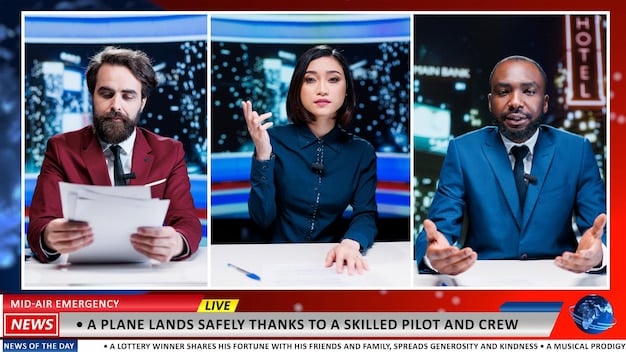
The Influence of Entertainment on Political Views
Entertainment, from movies and TV shows to video games, significantly shapes people’s perceptions of political issues. The way stories are framed can influence how viewers understand and respond to complex political topics.
Through narratives and character portrayals, entertainment can subtly or overtly promote certain political ideologies.
Movies and TV Shows: Reflecting and Shaping Reality
Movies and TV shows often serve as both mirrors and shapers of societal attitudes.
They can introduce viewers to political concepts and debates in an accessible and engaging way.
- Political dramas like “The West Wing” can inspire viewers and provide insights into the inner workings of government.
- Documentaries can shed light on important social issues and encourage viewers to take action.
- Even fictional stories can subtly promote political messages through character arcs and thematic elements.
Video Games: Political Commentary in Interactive Form
Video games offer a unique platform for political commentary through interactive storytelling.
- Games can explore themes like war, corruption, and social justice in a way that is both thought-provoking and engaging.
- They can also allow players to explore the consequences of their choices and consider different perspectives on complex issues.
- However, the potential for propaganda and indoctrination is a concern, as developers can use games to push political messages.
Ultimately, entertainment has the power to shape political views. Recognizing entertainment’s influence is crucial to unbiasedly discern facts from the fiction of political narratives.
The Role of Memes and Online Humor
Memes and online humor have become critical tools in political communication. They can condense complex political ideas into easily digestible and shareable formats.
The use of humor can make political messages more accessible and relatable, particularly to younger audiences.
Memes as Political Commentary
Memes often function as sharp critiques of political figures and policies.
- They can quickly spread through social media, raising awareness about important issues and generating political discussion.
- The use of humor can make these critiques more palatable and engaging, encouraging people to share them with their networks.
- However, the potential for misinformation and distortion is a concern, as memes often oversimplify complex issues.
The Power of Satire and Parody
Satire and parody can be powerful tools for challenging political establishments and holding leaders accountable.
- Shows like “Saturday Night Live” and “The Daily Show” use humor to critique political figures and policies.
- These shows can reach a large audience and influence public opinion.
- However, critics argue that satire can sometimes trivialize important issues.
In conclusion, memes and online humor play a significant role in modern political communication. Understanding that tools like memes can often trivialize or distort critical information is key for responsible consideration.
Analyzing the Impact on Voter Behavior
Pop culture’s influence extends beyond simple awareness and can directly impact voter behavior. Understanding this effect is essential for political strategists and anyone interested in civic engagement.
The way political messages are framed in pop culture can directly influence how people vote.
The Power of Emotional Appeals
Pop culture often relies on emotional appeals to resonate with audiences. Emotion is a prominent factor for voters.
- These appeals can be highly effective in mobilizing voters and shaping their opinions.
- However, they can also be manipulative and misleading, as emotions can often override reason and logic.
- Political campaigns are increasingly using emotional appeals in their messaging, raising questions about transparency and ethics.
The Impact on Youth Voter Turnout
Pop culture can be particularly effective in engaging young voters. Making content relatable can promote turnout.
- Youth voter turnout has historically been lower than that of older demographics, but pop culture can help bridge this gap.
- Celebrity endorsements, social media campaigns, and viral trends can all help raise awareness and motivate young people to vote.
- However, it is important to ensure that these efforts are authentic and not simply performative, as young voters are often skeptical of inauthentic engagement.
Ultimately, pop culture significantly affects voter behavior. Being aware of emotional pulls and focusing on the motivation of particularly young voters is crucial for recognizing the pop culture effect.
Looking Ahead: Pop Culture in the 2025 Political Landscape
As we look ahead to 2025, the influence of pop culture on political discourse is likely to grow. New technologies and platforms will continue to emerge, shaping how political messages are disseminated and received.
Staying informed and critically evaluating pop culture’s role is crucial for participating in the political process.
Emerging Technologies and Platforms
New forms of media and technology are constantly emerging, changing the way people engage with political content.
- Virtual reality, augmented reality, and artificial intelligence are all poised to play a role in future political campaigns.
- These technologies can create immersive and personalized experiences that can deeply resonate with voters.
- However, they also raise concerns about manipulation and the spread of misinformation.
The Importance of Media Literacy
In an era of fake news and misinformation, media literacy is more important than ever.
- Voters need to be able to critically evaluate sources of information and identify bias and propaganda.
- Educational programs and public awareness campaigns can help improve media literacy skills.
- The future of democracy depends on an informed and engaged electorate capable of discerning fact from fiction.
| Key Point | Brief Description |
|---|---|
| 🎵 Music & Politics | Historical protest songs and modern activism shape political views. |
| 📱 Social Media’s Impact | Viral trends and influencer campaigns influence political discourse. |
| 🎬 Entertainment’s Role | Movies, TV shows, and games shape political perceptions and engagement. |
| 😂 Memes & Humor | Memes and online humor are used for political commentary and mobilization. |
Frequently Asked Questions
▼
Music has historically served as a powerful tool for social and political commentary. From protest songs in the ’60s to modern hip-hop, it amplifies messages and mobilizes movements.
▼
Celebrities can raise awareness and endorse candidates, but their impact varies. Authenticity is key; disingenuous activism can backfire, diminishing both the celebrity’s and the politician’s credibility.
▼
Social media’s speed and reach can amplify misinformation. Algorithms often prioritize engagement over accuracy, which needs careful regulation to ensure a responsible political discourse.
▼
Yes, entertainment shapes perceptions of political issues. Narratives can promote ideologies subtly. Documentaries can shed light on societal issues, influencing viewers’ political inclination.
▼
Media literacy is vital for critically evaluating information sources. Identifying bias is crucial. Democracy relies on an informed electorate that can distinguish fact from manipulated political narratives.
Conclusion
The intersection of pop culture and political discourse is increasingly significant in the US, particularly as we anticipate the trends of 2025. By understanding how music, social media, entertainment, and online humor shape political opinions and voter behavior, citizens can engage more thoughtfully in the democratic process and make informed decisions.



